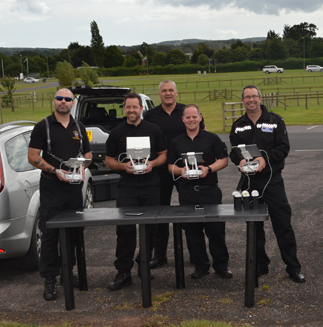Two police forces using drones have had that work certificated by SSAIB, the security and fire sector certification body. They are Dorset, and Devon and Cornwall. The police forces can operate these unmanned aerial system (UAS) drones in compliance with the Surveillance Camera Code of Practice, as part of a strategic alliance between the south west neighbouring constabularies.
The project originated in a six-month trial of the operational deployment of an initial two drones with high definition cameras, capable of capturing video and still images. Aims for the use of drones were identified, including evidence capture and aerial mapping and situational awareness during incidents. Drones can assist officers on missing people searches, crime scene photography and responding to major road traffic collisions.
Each police drone can stay in the air for 18 minutes before a change of battery is required, though the use of several batteries provides the capability to remain operational for longer if required. Each UAS unit has a high definition downlink, meaning officers on the ground can see live footage captured by the drone in the air. Civil Aviation Authority regulations require drone operators to pass a national CAA-accredited qualification.
Adoption of drones by the two forces has required them to show their conformance with the Surveillance Camera Code, which covers public space surveillance by police and local government. SSAIB provides a third party certification service to the Surveillance Camera Commissioner, enabling ‘relevant authorities’ such as councils and the police, which operate public space surveillance systems, to demonstrate compliance.
Inspector Andy Hamilton of Devon and Cornwall Police, who oversaw the initial trial, said: “Drones offer many benefits that complement the National Police Air Service helicopter. Using a drone to capture still or video images on difficult terrain and hard to reach areas such as cliffs, woodland or the moors to find a missing person, combat wildlife crime or even during a firearm incident, will allow officers to gain vital information, quickly and safely and allow us to respond effectively at the scene.”
And PC Ricky Fidler, Drone Lead at Dorset Police, said: “The whole process to date has been relatively simple, I feel that being independently accredited should give the public confidence in our use of drones and that the processes we have in place are accurate and appropriate to ensure that they are used correctly and for the right reasons.”
SSAIB provides a third party certification service to the Surveillance Camera Commissioner. Full certification (which lasts for five years) is achieved in a two-step process, with an initial desktop review of an organisation’s completed self-assessment being followed within 12 months by an on-site audit. The Commissioner is required to ensure that ‘relevant authorities’, including local authorities and the police, comply with the code. Others which have achieved certification against the Code of Practice after an SSAIB-conducted audit include the high street retailer Marks & Spencer, Aston University, Community Safety Glasgow and councils such as Liverpool City Council, Kings Lynn & West Norfolk Borough Council, and the London boroughs of Brent, Enfield, Hackney, Islington and Waltham Forest.
About the SSAIB:
Founded in 1994 and based in Tyne & Wear, SSAIB is a certification body for providers of electronic security systems, guarding security services, fire protection, alarm and telecare services systems in the UK and Republic of Ireland. SSAIB offers management systems certification, including ISO 9001 quality management systems and ISO 14001 environmental management systems. Over 1700 companies are on SSAIB’s register. Visit www.ssaib.org.









